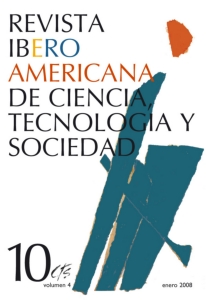Mobility of Uruguayan Researchers
DOI:
https://doi.org/10.52712/issn.1850-0013-914Keywords:
mobility, researchers, production of knowledgeAbstract
The migration and mobility of highly skilled human resources has become a point of reflection in the current discussions of S&T studies. This paper analyzes the mobility of researchers from the Universidad de la República of Uruguay to different regions. The focus is on describing quantitatively and qualitatively the relevance of these academic displacements, as well as analyzing how they influence research practices.
Downloads
References
ADAMS, W. (1971): El drenaje de talentos, Buenos Aires, Paidós.
ALBORNOZ, M., E. FERNÁNDEZ POLCUCH y C. ALFARAZ (2002): Hacia una nueva estimación de la "fuga de cerebros", Centro Redes, documento de trabajo Nº 1, disponible en www.centroredes.org.ar
ARGENTI, G., C. FILGUEIRA y J. SUTZ (1988): Ciencia y tecnología: un diagnóstico de oportunidades, Montevideo, CIESU-Ministerio de Educación y Cultura, Ediciones de la Banda Oriental.
ARVANITIS, R. (s/f): "Transferencia de tecnología y aprendizaje tecnológico: reflexiones basadas en trabajos empíricos", El trimestre económico, Vol. 61, Nº 2, pp. 272-279.
BIELLI, A, A. BUTI y N. VISCARDI (2002): Mujeres investigadoras uruguayas: ¿participación real o incierta?, Montevideo, informe de investigación UNESCO / OEI.
BORJA, J. y M. CASTELLS (1997): Local y global. La gestión de las ciudades en la era de la información, Madrid, Taurus.
CASTELLS, M. (1997): La sociedad red, Madrid, Alianza.
CASTLES, S. (2000): "Migraciones Internacionales a comienzos del siglo XXI: tendencias y problemas mundiales", en "Las migraciones internacionales 2000", Revista Internacional de Ciencias Sociales, Nº 165, UNESCO, pp. 17-32.
DEDIJER, S. (1971): "Primeras migraciones", en W. Adams (ed.): El drenaje de talentos, Buenos Aires, Paidós, pp. 35-61.
DOMENACH, H. y M. PICOUET (1995): Las migraciones, Córdoba, Universidad Nacional de Córdoba.
GAILLARD, A. M. (1999): Les enjeux des migrations scientifiques internationales. De la quête du savoir à la circulation des compétences, París, L'Harmattan.
GARCÍA CANCLINI, N.(1995): Consumidores y ciudadanos. Conflictos multiculturales de la globalización, México DF, Grijalbo.
GIBBONS, M et al. (1994): The New Production of Knowledge: The Dynamics of Science and Research in Contemporary Societies, London, Sage.
GRANBERG, A. (1971): "La migración de científicos en la antigüedad", en W. Adams (ed.): El drenaje de talentos, Buenos Aires, Paidós, pp. 61-69.
MÁRMORA, L. (1997): Las políticas de migraciones internacionales, Buenos Aires, Alianza.
ODDONE, J. y B. PARIS (1971): La Universidad Uruguaya del militarismo a la crisis (1885-1958), tomo II, Montevideo, Universidad de la República.
OTEIZA, E. (1967): La emigración altamente calificada en la Argentina. Un caso de brain drain latinoamericano, Buenos Aires, Instituto Torcuato di Tella.
OTEIZA, E. (1969): Emigración de profesionales, técnicos y obreros calificados argen-tinos a los Estados Unidos. Análisis de sus fluctuaciones (actualizado con los datos del período julio 1966 a junio de 1968), Buenos Aires, Instituto Torcuato di Tella.
PELLEGRINO, A. (2001): ¿Drenaje o éxodo? Reflexiones sobre la migración calificada, Montevideo, Cuadernos del Rectorado, UDELAR.
PELLEGRINO, A. (1993): La emigración de profesionales y técnicos latinoamericanos, Montevideo, Universidad de la República, Facultad de Ciencias Sociales, Serie Documentos de Trabajo.
PELLEGRINO, A. (s/f): Reflexiones sobre la migración calificada, disponible en http://lanic.utexas.edu/-sela
PELLEGRINO, A. y W. CABELLA (1998): "Emigración de científicos: el caso de Uruguay en el nuevo nomadismo, La perspectiva latinoamericana, ESAP, pp 335-349.
POLANYI, M. (1958): Personal Knowledge, Chicago, The University of Chicago Press.
SUTZ, J. (1986): El auge de la industria electrónica profesional uruguaya: raíces y pers-pectivas, Montevideo, Cuadernos del CIESU.
Downloads
Published
How to Cite
Issue
Section
License
Copyright (c) 2025 CC Attribution 4.0

This work is licensed under a Creative Commons Attribution 4.0 International License.
All CTS's issues and academic articles are under a CC-BY license.
Since 2007, CTS has provided open and free access to all its contents, including the complete archive of its quarterly edition and the different products presented in its electronic platform. This decision is based on the belief that offering free access to published materials helps to build a greater and better exchange of knowledge.
In turn, for the quarterly edition, CTS allows institutional and thematic repositories, as well as personal web pages, to self-archive articles in their post-print or editorial version, immediately after the publication of the final version of each issue and under the condition that a link to the original source will be incorporated into the self-archive.











